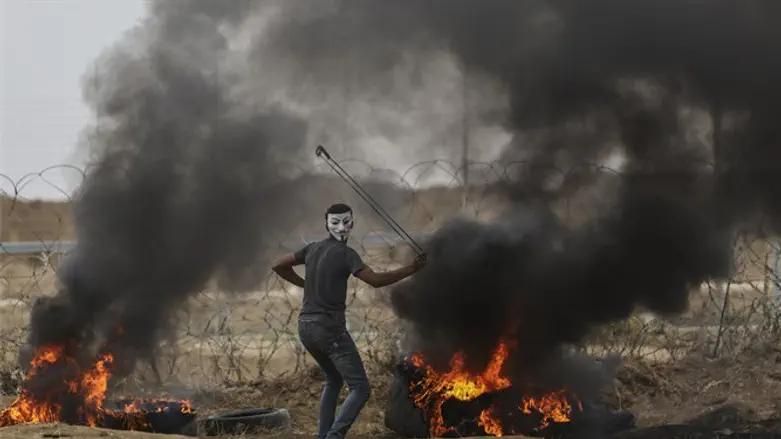
Yochanan Visser is an independent journalist/analyst who worked for many years as Middle East correspondent for Western Journalism.com in Arizona and was a frequent publicist for the main Dutch paper De Volkskrant. He authoreda book in the Dutch language about the cognitive war against Israel and now lives in Gush Etzion. He writes a twice weekly analysis of current issues for Arutz Sheva.
The incendiary kites Hamas uses in its latest terror campaign against Israel are increasingly becoming a major problem for Israel.
About 25,000 dunams in southern Israel have gone up in flames since the start of the ‘Great March of Return at the end of March this year, among them 5,000 dunams of wheat, avocado orchards, jojoba fields and national parks.
The damages are estimated at 7 million shekels while resources to fight the problem so far have cost the state roughly 2 million shekels.
Fire and Rescue Services Commissioner Brig. Gen. Dedi Simchi doesn’t expect the wave of kite terror to end soon and warned last week of the possibility Hamas will exacerbate the use of the new ‘weapon’ throughout this summer and even the next one.
“It’s important for all the communities to learn about fire preparedness, because just as we thought at first that the Qassam rockets would end within a few days, we have to be prepared for the possibility that there will be kites next summer too,” Simchi told participants in a forum at Kibbutz Be’eri last week.
Hamas, meanwhile, threatens to step up the attacks with terror balloons and kites and claims it could hit targets in Israel as far as 40 kilometers away from the Gaza border until ‘the siege’ is lifted, a reference to limitations on imports from Israel because of the misuse of materials for the Islamist group’s terror infrastructure in the enclave.
MK Avi Dichter, the chairman of the Foreign Affairs and Defense Committee of the Knesset, who took part in the discussions at Kibbutz Be’eri said Hamas has “switched to terror that looks like a popularly initiated activity, because they were afraid of our reactions to organized terror, but we know that the terror of the kites is also organized and has a perpetrator.”
For this reason, the Israeli military now treats the wave of kite attacks as regular terror and has begun targeting the cells which organize and carry out the attacks.
On Sunday, the IAF used an attack drone to fire warning shots at a group of Hamas terrorists who were preparing new kite-and-balloon attacks east of the city of Khan Younis in Gaza.
This happened after terrorists caused six new fires in the Sha’ar Hanegev region in southern Israel.
Early Sunday morning, the Israeli air force also blew up the car of one of the Hamas commanders responsible for organizing the wave of terror attacks with balloons and kites.
“Our forces launched an airstrike against the vehicle of one of the leaders of a cell relating to incendiary and explosive kites and balloons. The attack was carried out in response to the ongoing launching of incendiary and explosive kites and balloons into Israel,” the Israeli army said in a statement.
Hamas-controlled media in Gaza later reported there had been no casualties in the attack on the car since it was empty at the time.
Chances are high the IAF and IDF will move beyond firing warning shots when Hamas continues its latest terror campaign against Israel. However, the deteriorating security situation in southern Israel has sparked a broader debate on the way Israel should react to Hamas’ latest terror campaign against the Jewish state.
While discussions in the Security Cabinet last week mainly focused on the ongoing humanitarian crisis in the Gaza Strip, leading experts on the Palestinian-Israeli conflict call for a radically different approach to the huge problems in southern Israel and the Gaza Strip.
One of them is Prof. Ephraim Karsh, a former emeritus professor of Middle East and Mediterranean studies at King’s College London and now the director of the Begin-Sadat Center for Strategic Studies.
“It is not Gaza’s economic malaise that has precipitated Palestinian violence; rather, it is the endemic violence that has caused the Strip’s humanitarian crisis,” Karsh wrote in an article titled “It’s not the Gaza economy, stupid.”
"So long as Gaza continues to be governed by Hamas’ rule of the jungle, no Palestinian civil society, let alone a viable state, can develop,” according to Karsh who called for “a comprehensive socio-political and educational transformation” in Palestinian society as a whole.
The Middle East expert compared this transformation to what happened after WWII in Germany and Japan and said Palestinian Arabs should be educated ib the “the virtues of coexistence with Israel.”
Prof. Hillel Frisch, a professor of political and Middle East studies at Bar-Ilan University, concurred and wrote in an analysis for the Begin Sadat Center that Hamas should be defeated just as the Palestinian terrorist movements were defeated by the IDF during the so-called Second Intifada.
After crushing Hamas the international community and Israel should revisit the Marshall plan for Europe as a means to “facilitate the transformation of a destructive foe into a staunch and healthy ally,” according to Frisch.
“Only a policy of toughness towards Hamas can induce it to assure stability and quiet in Gaza,” the Bar-Ilan professor wrote.
“Only when Hamas envisions its territory as a future Singapore rather than a murderous labyrinth of fundamentalist terrorism should economic benefits accrue to Gaza,” Frisch concluded his analysis.